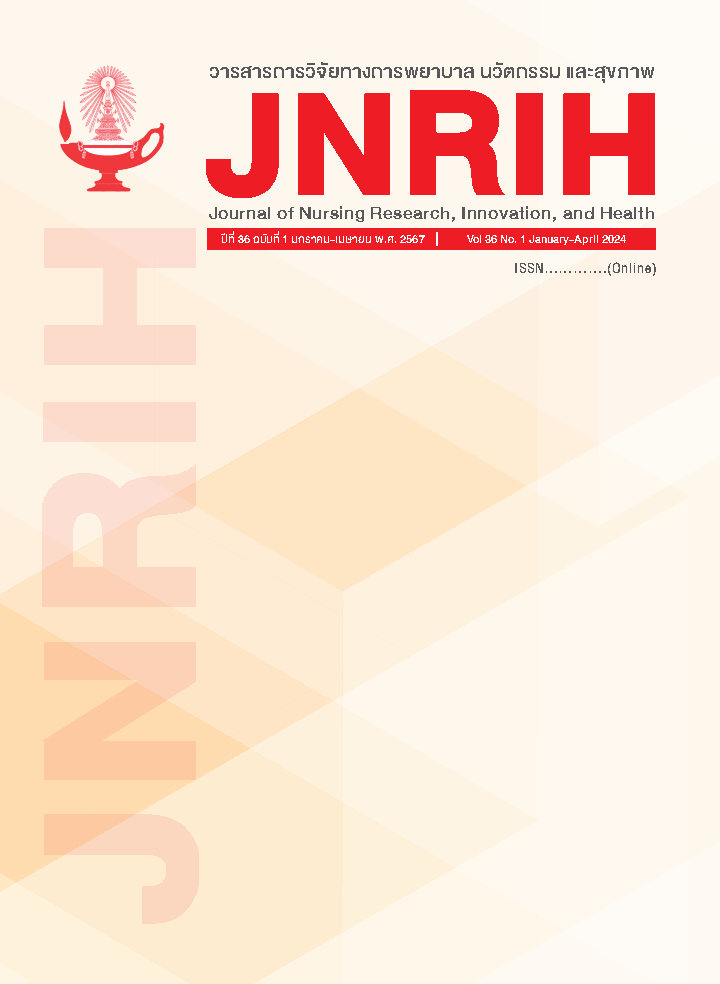ปัจจัยคัดสรรที่มีความสัมพันธ์กับการทำพินัยกรรมชีวิต ในผู้ที่เป็นมะเร็ง
คำสำคัญ:
: พินัยกรรมชีวิต, ผู้ที่เป็นมะเร็งบทคัดย่อ
วัตถุประสงค์: ศึกษาการทำพินัยกรรมชีวิต และความสัมพันธ์ระหว่าง อายุ ระยะของโรค ความรุนแรงของอาการ ความรู้เกี่ยวกับการทำพินัยกรรมชีวิต ความวิตกกังวลเกี่ยวกับความตาย การสนับสนุนทางสังคมกับการทำพินัยกรรมชีวิตของผู้ที่เป็นมะเร็ง
รูปแบบการวิจัย: การวิจัยเชิงบรรยายแบบหาความสัมพันธ์
วิธีดำเนินการวิจัย: กลุ่มตัวอย่าง คือ ผู้ที่ได้รับการวินิจฉัยว่าเป็นโรคมะเร็ง และรับบริการที่คลินิกโรคมะเร็งของโรงพยาบาลระดับตติยภูมิในเขตกรุงเทพมหานคร จำนวน 180 คน เครื่องมือวิจัย คือ แบบสอบถามข้อมูลส่วนบุคคล แบบสอบถามการทำพินัยกรรมชีวิต แบบประเมินความรู้เกี่ยวกับการทำพินัยกรรมชีวิตมีค่า KR-20 เท่ากับ .81 แบบประเมินความรุนแรงของอาการ แบบสอบถามความวิตกกังวลเกี่ยวกับ ความตาย และแบบสอบถามการสนับสนุนทางสังคม มีค่าสัมประสิทธิ์แอลฟาของครอนบาค เท่ากับ .88, .90 และ .89 (ตามลำดับ) วิเคราะห์ข้อมูลโดยสถิติเชิงพรรณนาและสถิติการวิเคราะห์การถดถอยโลจิกติกส์
ผลการศึกษา: ผลการศึกษาพบว่า กลุ่มตัวอย่างจำนวน 180 เป็นผู้ที่เป็นมะเร็งที่ทำพินัยกรรมชีวิต 67 คน คิดเป็นร้อยละ 37.2 และผู้ที่เป็นมะเร็งที่ไม่ได้ทำพินัยกรรมชีวิต จำนวน 113 คน คิดเป็นร้อยละ 62.8 โดยส่วนใหญ่ทำด้วยวิธีการบอกกล่าวร้อยละ 49.2 ปัจจัยที่ทำให้ผู้ที่เป็นมะเร็งทำพินัยกรรมชีวิตมากขึ้น ได้แก่ ผู้ที่มีอายุ 60 ปีขึ้นไป เป็นมะเร็งระยะลุกลาม ความรุนแรงของอาการ และความรู้เกี่ยวกับการทำพินัยกรรมชีวิต (OR= 2.63, 7.59, 1.05, 1.79 ตามลำดับ, p<.05) และปัจจัยที่ทำให้ผู้ที่เป็นมะเร็งทำพินัยกรรมชีวิตลดลง ได้แก่ ความวิตกกังวลเกี่ยวกับความตาย (OR= 0.87, p<.05)
เอกสารอ้างอิง
Ministry of Public Health, Department of Medical Services. Annual report 2018. Department of Medical Services, Ministry of Public Health. 2018. 100 p.
Ministry of Public Health, Department of Medical Services, National Cancer Institute. Annual report 2017. Department of Medical Services, Ministry of Public Health. 2017. 122 p.
Introntakun K, Thanasilp S, Supametaporn P. Experiences of caring for patients with advanced cancer at home of family caregivers. J Nursing Science Chulalongkorn University [Internet]. 2023 [cited 2024 Jan 20];35(2):12-23. Available form: https://he01.tci-thaijo.org/index.php/CUNS/article/view/265757/179281. [In Thai]
Sawaeng B. Letter of intent regarding medical treatment at the end of life. Bangkok: National Health Commission Office (NHCO); 2009.
Thompson TD, Barbour RS, Schwartz L. Health professionals’ views on advance directives: a qualitative interdisciplinary study. Palliat Med. 2003;5:403-9.
Thingakrue B. Siri P. Phumson N. Ruangtong I. The Role of nurses in ethical decision- making for end-of-life cancer patients: Withholding or withdrawing life-sustaining Interventions. J Nursing Science Chulalongkorn University [Internet]. 2023 [cited 2024 Feb 2];35(3):1-12. Available form: https://he01.tci-thaijo.org/index.php/CUNS/article/view/ 267881/180824 [In Thai]
Cardona-Morrell M, Kim J, Turner RM, Anstey M, Mitchell IA, Hillman K. Non-beneficial treatments in hospital at the end of life: a systematic review on extent of the problem. Int J Qual Health Care [Internet]. 2016 May 12 [cited 2024 Mar 25];28(4):456-69. Available form: https://research-ebsco-com.chula.idm.oclc.org/c/3q5j6g/viewer/pdf/magmnpv37r doi: 10.1093/intqhc/mzw060
Kim S, Koh S, Park K, Kim J. End-of-life care decisions using a Korean advance directive among cancer patient–caregiver dyads. Palliative and Supportive Care [Internet]. 2017 Feb 1 [cited 2024 Mar 25];15(1):77- 87. Available from: https://research-ebsco-com.chula.idm. oclc.org/linkprocessor/plink?id=b881655f-4569-3119-b87a-38f306cd6a1a
Lynn T, Curtis A, Lagerwey MD. Association between attitude toward death and completion of advance directives. Omega [Internet]. 2016 Dec 1 [cited 2024 Mar 25];74(2):193–211. Available from: https://research-ebsco-com.chula.idm.oclc.org/linkprocessor/plink?id= f5350548-8cbb-3ae2-8d1c-26751bb6eaab
Rodenbach RA, Althouse AD, Schenker Y, Smith TJ, Chu E, White DB, et al.. Relationships Between Advanced Cancer Patients’ Worry About Dying and Illness Understanding, Treatment Preferences, and Advance Care Planning. J. Pain Symptom Manage 2021;61(4): 723-31. doi:https://doi.org/10.1016/j.jpainsymman.2020.09.004
Chinda M, Jaturapatporn D, Kirshen AJ, Udomsubpayakul U. Reliability and validity of a Thai version of the edmonton symptom assessment scale (ESAS-Thai). J Pain Symptom Manage 2011;42(6):954-60.doi:10.1016/j.jpainsymman.2011.02.020
Phiphattanawong W. Factors related to the decision to make an advance letter of intent regarding treatment at the end of life. Bangkok: Chulalongkorn University; 2017. [In Thai]
Conte HR, Weiner MB, Plutchik R. Measuring death anxiety: conceptual, psychometric, and factor-analytic aspects. J Pers Soc Psychol [Internet]. 1982 Jan 1 [cited 2024 Mar 25];43(4):775–85.Available from: https://research-ebsco-com.chula.idm.oclc.org/ linkprocessor/plink? id=e97bde92-4b22-3e93-916b-5fb5b9514e32
Maliwon K. Factors associated with acceptance of death in patients with advanced cancer. [Thesis]. Bangkok: Chulalongkorn University; 2018. [In Thai]
Hanucharurnkul S. Social support, self-care, and quality of life in cancer patients receiving radiotherapy in Thailand [dissertation on the Internet]. Wayne State University; 1998 Jan 1 [cited 2024 Mar 25]; Available from: https://research-ebsco-com.chula.idm.oclc.org/ linkprocessor/ plink?id=f6a4b8f2-7062-3885-973d-8831def0dafb
Wanichbancha K. Advanced statistical analysis with SPSS for windows. Bangkok: Chulalongkorn University; 2006. [In Thai]
Phurithummachote P. Attitudes towards making a life will and factors affecting the decision to make a life will of patients at Borabue Hospital. Acad J Mahasarakham Provincial Public Health Office [Internet]. 2016 [cited Feb 2];1(1):39-52. Available form: https://thaidj.org/index.php/AJMP/article/view/7407 [In Thai]
Supavadee W. Factors affecting the expressing of intent in advance to exercise the right to die peacefully at the end of life in the elderly. Bangkok: Kasetsart University Press; 2003. [In Thai]
ดาวน์โหลด
เผยแพร่แล้ว
ฉบับ
ประเภทบทความ
สัญญาอนุญาต
ลิขสิทธิ์ (c) 2024 วารสารพยาบาลศาสตร์ จุฬาลงกรณ์มหาวิทยาลัย

อนุญาตภายใต้เงื่อนไข Creative Commons Attribution-NonCommercial-NoDerivatives 4.0 International License.
##default.contextSettings.thaijo.licenseTerms##


